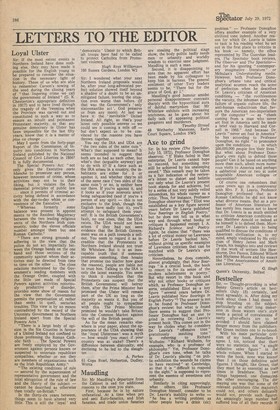Axe to grind
Sir: In his review (The Spectator, July 15, 1972), Professor Donoghue observes: "If Blake failed in that enterprise, Dr Leavis cannot hope to succeed, but something may still be achieved by his unsleeping sword." This remark may be taken as a 'fair indication of the reviewer's intent to distort and belittle not only what Dr Leavis's present book stands for and achieves, but by a series of not very subtly veiled innuendoes, his whole career as a critic. Thus, for instance, Professor Donoghue observes that "Eliot was established as a key figure several years before Dr Leavis published New Bearings in English Poetry," but he does not tell us in what way and through what books or critiques it happened except I. A. Richard's Science and Poetry. Again, he claims that "there was a lot of critical money on Lawrence before Dr Leavis backed him," without giving us specific examples of Lawrence criticism that can be matched with Dr Leavis's qua criticism. Nevertheless, he does concede, almost grudgingly, that New Bearings "is a crucial book, the book to resort to for its sense of the modern acheivement in poetry." But why resort to this book and why not other books or critiques which, as Professor Donoghue asserts, established Eliot as a key figure "several years before Dr. Leavis published New Bearings in English Poetry "? The answer is not to be found in Professor Donoghue's review; but what is found there seems to suggest that Professor Donoghue had an axe to grind in reviewing Dr. Leavis's present book. This comes out in the way he chides what he considers Dr. Leavis's "offensive tone"
gratuitously insulting tone" in referring to Richard Wolheim: "Richard Wolheim, for example, who is a professor of philosophy." Yet, Professor Donoghue's own tone, when he talks of Dr. Leavis's placing "on public exhibition the wounds he claims to have received" at Cambridge, so that it is "difficult to respond to the sight," is supposed to represent the essence of sweetness and urbanity.
Similarly in citing approvingly, what others, like Professor Donoghue himself, consider to be Dr. Leavis's inability to write — "he has a writing problem as other people have a drink (sic)
problem" — Professor Donoghue offers another example of a very civilized tone indeed. Another reason for which Dr. Leavis is taken to task is his reading what he set out in the first place to criticize in his book — namely, the ethos represented by The Guardian leaders, The Spectator book reviews, The Observer and The Spectator— and for his ignoring "contemporary imaginative literature" or Mchulan's Understanding media. However, both Professor Donoghue's urbane tone and critical analytical acumen reach the acme of perfection when he describes Dr. Leavis's criticism of American conditions — "the roothlessness the vacuity, the inhuman scale, the failure of organic culture life, the anti-human reductivism that favours the American neo-imperialism of the computer" — as "cheek coming from a man who never set foot in America until he made a brief visit to Harvard and Cornell in 1966." And because Dr. Leavis "never set foot in America" he has according to Professor Donoghue, no right "to pronounce upon the conditions . . . in which 200,000,000 people live their lives." But what about Professor Donoghue's own right to defend those people? Can it be based on anything more than such, albeit more numerous visits to America and perhaps a sabbatical year or two at some hospitable American colleges or universities?
Of course one remembers that some years ago in a controversy with Mrs. F. R. Leavis, Professor Donoghue professed that as a Roman Catholic he did not know what divorce means. But as a professor of American literature he has surely less reason not to know that Dr. Leavis is as much entitled to criticize American conditions as was Matthew Arnold or indeed as he himself is to defend them. Moreover Dr. Leavis's claim to being qualified to discuss the conditions of American civilization is, to my mind, amply vindicated by ffis criticism of Henry James and Mark Twain, his insights into and reviews of the work of writers like Hawthorne, Dos Passos, Edmund Wilson and Marianne Moore and his essays like "The Americanness of American Literature."
G. Singh
Queen's University, Belfast








































 Previous page
Previous page